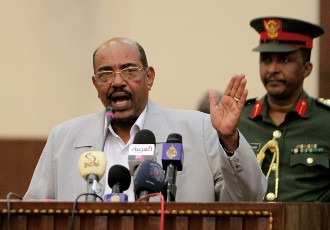Sudan’s Bashir says selection of ministers was not easy
December 9, 2013 (KHARTOUM) – Sudanese president Omer Hassan Al-Bashir said that he had conducted wide-ranging consultations before announcing the cabinet reshuffle, describing the new ministers as the best faces to meet the challenges facing the country.

The biggest surprise in the reshuffle was the departure of presidential assistant Nafie Ali Nafie from the government and the NCP leadership, as well as the former first vice-president, Ali Osman Taha, who had been marginalised since the signing of the Comprehensive Peace Agreement (CPA) in 2005.
Speaking at Tuesday’s swearing in ceremony, Bashir stressed that the selection process was not easy because Sudan is full of qualified people, adding that people had become desperate for change.
The president expressed confidence in his new cabinet, saying he is confident it will rise to the challenges facing Sudan.
He directed his deputies and ministers to conduct their work responsibly and to work as a team. He also called on ministers to accept Shura (consultation), adding that his door will always be open to them.
He also disclosed that Amira Al-sir, who was appointed as a state minister at the ministry of tourism, had apologised to her predecessor, Adil Hamid Daglo, after accepting the position.
The vice-president, Hassabo Mohamed Abdalla, announced the continuation of dialogue with opposition parties, rebel groups and civil society, with the aim of drafting a constitution which realises national interests, adding that he will carry out his work in an honest and transparent manner to meet the aspirations of the Sudanese people.
He stressed the government would continue negotiations with rebel groups on joining the peace process, saying that the next stage would witness extensive work on the economic front, particularly in the domain of economic reform in order to sustain growth.
Hassabo, who is a former minister from the Darfur region, expressed appreciation for the trust placed in him by the president and the leadership of the ruling National Congress Party (NCP).
The state minister at the defence ministry, Yahia Mohamed Khair, said that his ministry will work as a team with all concerned ministries, as well as the chiefs of staff to achieve victories for armed forces on the frontline.
While the state minister at the ministry of information, Yasir Youssef, said that new appointees were taking office at a critical time in Sudan’s history.
He stressed that the new cabinet would exert its utmost efforts to serve the country despite the significant political, economic and security challenges ahead.
MINISTER OF ECONOMY OPTIMISTIC
The minister of finance, Badr Al-Deen Mahmoud Abas, vowed to reduce government spending, pointing out that the next budget will not include additional burden on the people.
Announcing a five-year program of economic reforms, Abas said that his first priority is to achieve monetary and fiscal stability, adding that his mission is difficult but not impossible.
The new minister said he remains optimistic about the future of the country, stressing that he will cooperate with all economists irrespective of their political affiliation.
He further said that the economy faces significant challenges which require collaboration and strategic vision in order to lift the economy and boost production, asserting that his ministry will work towards utilising Sudan’s potentials and resources.
Abas said his ministry understand the economic difficulties faced by the Sudanese people during the previous period, adding that it is keen to continue implementing the policies adopted in the tripartite program.
He said that the government managed to achieve positive growth rates despite the huge economic difficulties, including high inflation rates, the decline in the value of the Sudanese pound and the high cost of living.
Sudan’s economy has been hit hard since the secession of South Sudan in July 2011, taking with it about 75% of the country’s oil output.
Last September, violent clashes erupted between protesters and security forces across Sudan following the government’s decision to remove fuel subsidies, leading to at least 70 deaths, according to official figures, although rights groups put the true death toll at more than a 200.
(ST)
